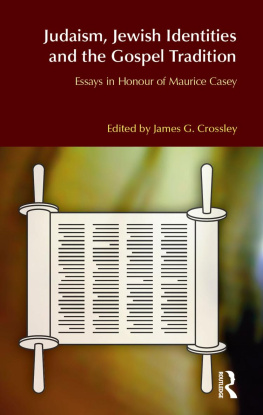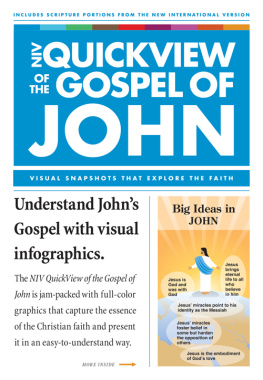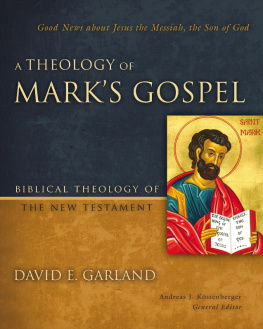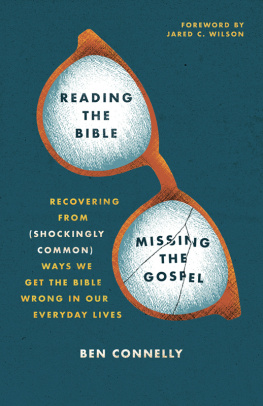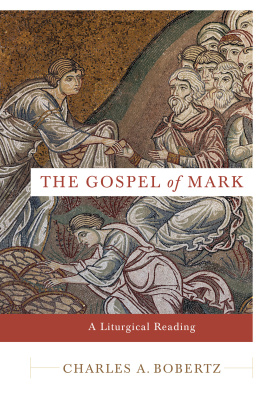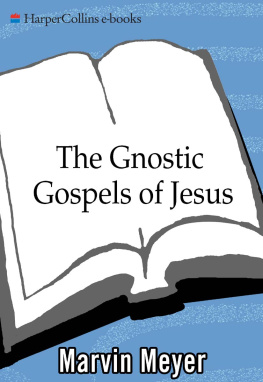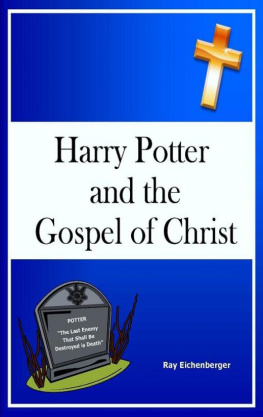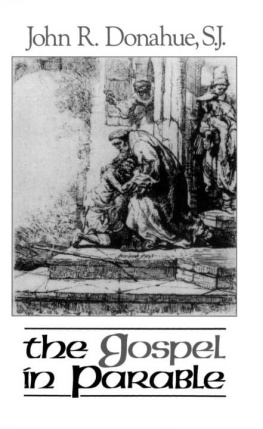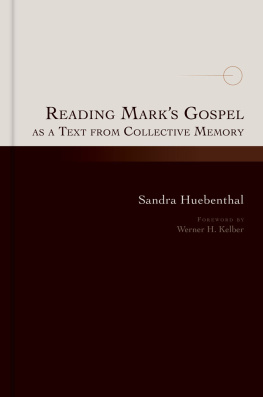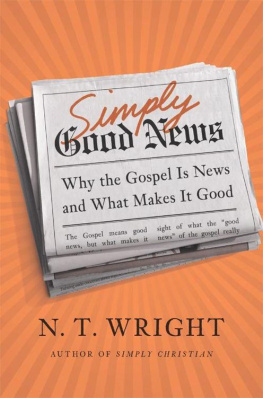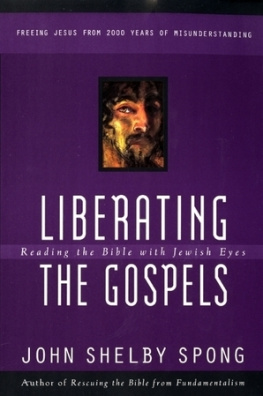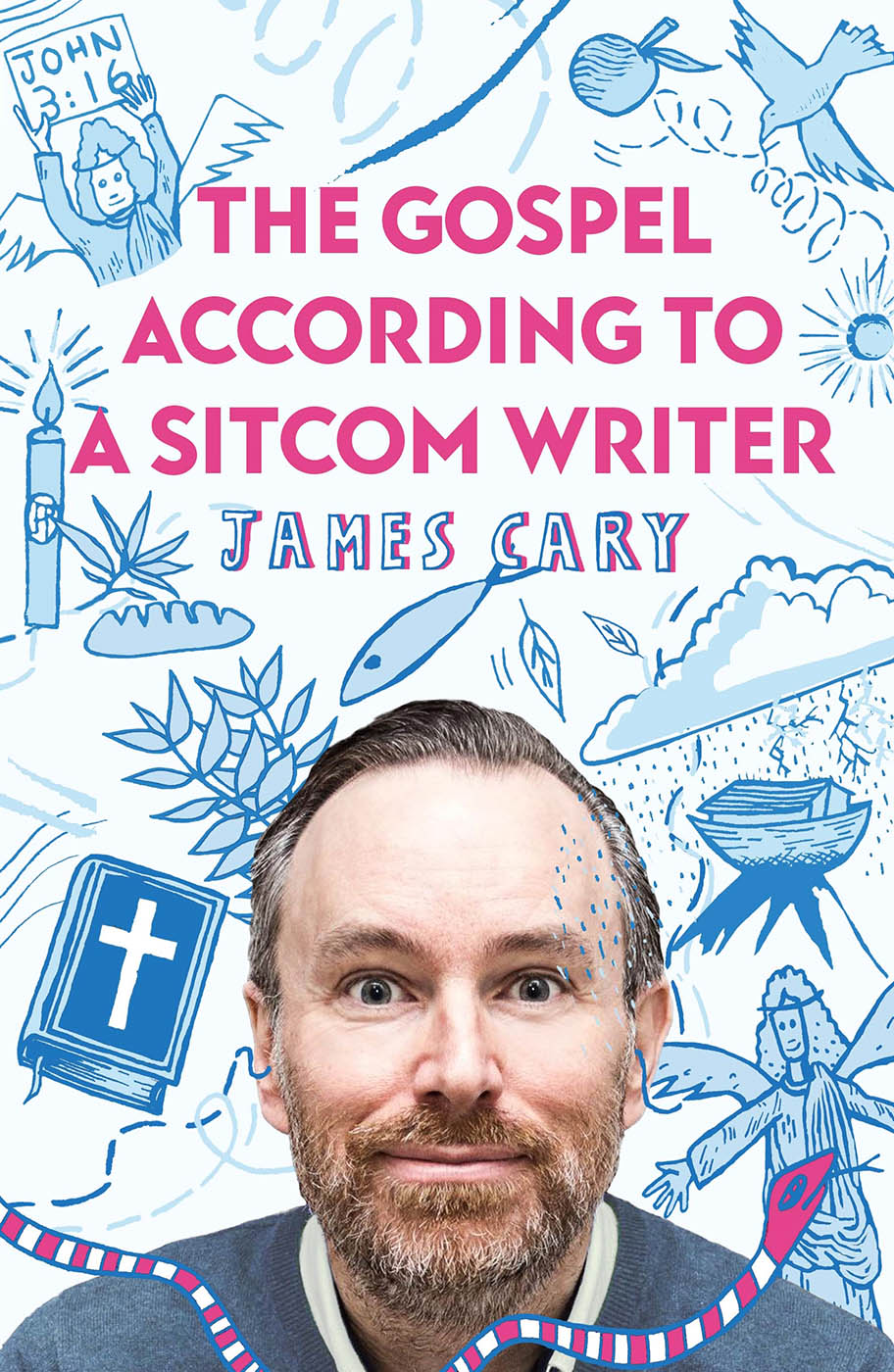James Cary is a sitcom writer for the BBC, with a hand in Miranda , Bluestone 42 , Thanks A Lot , Milton Jones and Hut 33. Hes also a member of the General Synod and the Archbishops Council. He blogs on religion and comedy and co-presents podcasts Sitcom Geeks and Cooper and Cary Have Words . He is the author of The Sacred Art of Joking , a look at how religion and comedy intersect (SPCK, 2018).
The Gospel According to a Sitcom Writer
James Cary

First published in Great Britain in 2021
Society for Promoting Christian Knowledge
36 Causton Street
London SW1P 4ST
www.spck.org.uk
Copyright James Cary 2021
James Cary has asserted his right under the Copyright, Designs and Patents Act, 1988, to be identified as Author of this work.
All rights reserved. No part of this book may be reproduced or transmitted in any form or by any means, electronic or mechanical, including photocopying, recording, or by any information storage and retrieval system, without permission in writing from the publisher.
SPCK does not necessarily endorse the individual views contained in its publications.
The author and publisher have made every effort to ensure that the external website addresses included in this book are correct and up to date at the time of going to press. The author and publisher are not responsible for the content, quality or continuing accessibility of the sites.
Unless otherwise noted, Scripture quotations are taken from The World English Bible (WEB), a public domain (no copyright) modern English translation of the Holy Bible, based on the American Standard Version of the Holy Bible first published in 1901, the Biblia Hebraica Stutgartensa Old Testament, and the Greek Majority Text New Testament.
Quotations marked esv are taken from the ESV Bible (The Holy Bible, English Standard Version), copyright 2001 by Crossway, a publishing ministry of Good News Publishers. Used by permission. All rights reserved.
Quotations marked niv are taken from The Holy Bible, New International Version (Anglicized edition). Copyright 1979, 1984, 2011 by Biblica. Used by permission of Hodder & Stoughton Ltd, an Hachette UK company. All rights reserved. niv is a registered trademark of Biblica. UK trademark number 1448790.
British Library Cataloguing-in-Publication Data
A catalogue record for this book is available from the British Library
ISBN 9780281085637
eBook ISBN 9780281085996
eBook by Falcon Oast Graphic Art Ltd
Introduction
W hat sort of book is The Gospel According to a Sitcom Writer ?
This book is funny. But it is also Christian. These tend not to go together.
When a bookshop gets a whiff of Christianity, it puts it in the Religion section. You know where it is, right? Through the coffee shop, up the back stairs by the wrapping paper and board games, past the loos (one is out of order, sorry), keep going until you come to Ordnance Survey Maps, then past Personal Finance, down a couple more steps (mind the low ceiling) and there, youll find a few dozen books on religion.
Somehow, religion, the single greatest motivator throughout human history and across much of the world today, is deemed niche. What a time to be alive. If you are wondering what sort of book this is, allow me to explain.
The sitcom bit
I am a sitcom writer. My first sitcom, Think the Unthinkable , was broadcast on Radio 4 on 16 October 2001 and Ive been fairly busy ever since. Sitcom writing is an unusual way to make a living. The pay is irregular and lumpy. You put in hours of work on a new show for zero reward. And then you get a couple of hundred pounds because your episode of My Family has been available to view on BA flights for the past 18 months. The amount of work you do often bears little relation to the money paid. TV pays five times more than radio, even though the audience figures might be the same, or even favour radio. The life of a writer, even a moderately successful sitcom writer, is uncertain.
So why put myself through the uncertainty and the trauma of having to make a roomful of three hundred complete strangers laugh three times a minute for half an hour, with the results broadcast on national TV or radio? Its a very good question. Im glad I asked it.
Essentially, it comes down to this: why do I want to make people laugh? For some its a defence mechanism, perhaps to prevent bullying at school, or a form of emotional self-protection. For others, its a need to be wanted and loved. The roar of the crowd can be intoxicating. Many stand-up comedians would admit to being addicted to it. I dont think any of those are my main motivation.
I have occasionally been responsible for audiences laughing loud, long and hard. The laughter you hear on the TV and the radio isnt fake. The audience is normally real. Ive sat in audiences for dozens of recordings of episodes of Think the Unthinkable , Hut 33 , My Hero or umpteen radio shows Ive written with Milton Jones. The people around me have no idea that the writer is sitting next to them. I dont need them to know I am one of the writers. In fact, I much prefer the anonymity. This could make my desire to hear that laughter more puzzling. But actually, it makes sense of it.
So Im not a sitcom writer because I find that sound of laughter addictive. I find it essential. If I hear the laugh, I know the joke has worked. And if I dont hear the laugh, I know the joke hasnt worked. Its pretty basic, and one of the reasons I dont really want to write drama how do you know if its working?
For me, writing comedy is an endless, fascinating puzzle. Coming up with a joke for each character in each situation is like solving a cryptic crossword clue. Each clue has multiple ingredients that need to be accounted for, and you know the right answer because it fits with 3 Down and has the correct number of letters. For me, that sound of the laugh means Ive found the answer. Ive cracked the puzzle. Ive found a way to make that character in that scene in that story say something thats objectively funny. And it feels good. When that happens, to quote Eric Liddell, I feel Gods pleasure. Thats because I dont see my job as a way to earn money and satisfy my curiosity. It is a divine calling.
The gospel bit
I care what God thinks about the comedy that I write, since Im a Christian. Im not a small c cultural Christian. Im a big C, all-in, confessing Christian. Over the years, Ive been involved in Christian conferences, conventions and festivals and the opportunity has arisen for me to perform, and Ive done so with some success. I define success as the audience mostly laughing in the places I had expected and planned.
Given the circumstances of these performances, Ive been playing to biblically literate audiences who have a pretty good idea of what the Bible says and how it sounds. Being a wordsmith, and an amateur theologian, Ive tried to make the most of these opportunities to create comedy that speaks directly into the Christian experience.
Many have found this refreshing and surprising. Not many people do this sort of thing, and you certainly wont find anything like it in the mainstream media these days. The size and location of the Religion section in a three-storey bookshop is one manifestation of our societys failure to understand religion generally and Christianity particularly. Moreover, Christians are very poorly represented on TV, and youll see a chapter on that very subject, along with a few reasons for it, and a bit of a rant, which you might find cathartic.


